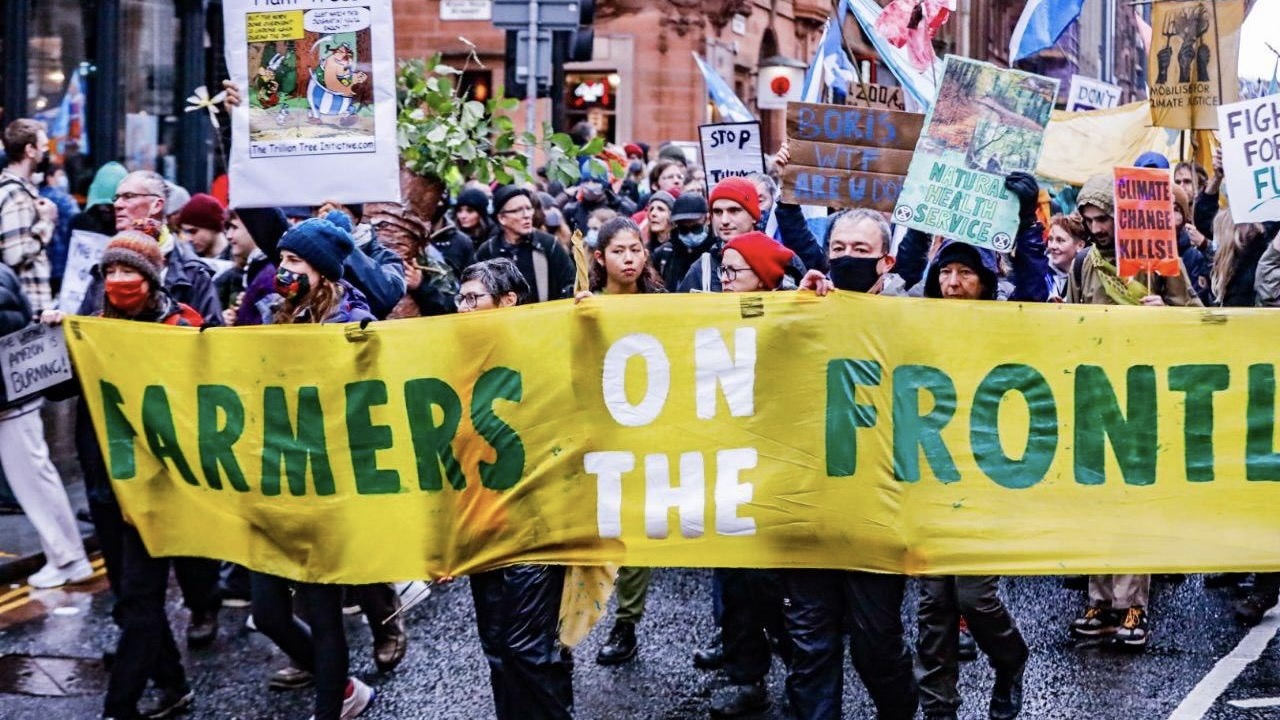The streets of Glasgow have been reverberating with demands for radical change to save the planet over the past week. On Saturday, November 6, people’s movements marked a global day of action to demand concrete action at the COP26 summit. Despite the heavy rain and extreme cold weather, over 100,000 people were on the streets, according to the organizers and local media. Indigenous organizations, frontline communities, trade unions, youth groups, peace and anti-war groups, communist and left organizations, and different environmental organizations took part in the march.
While the participants represented a wide spectrum of cases, they were united around the recognition that without system change, there is no way to take the urgent necessary measures to save the planet and advance climate justice. The hours-long march ended with a rally at the Glasgow Green park with speakers and musical performances.

Similar actions were carried out in dozens cities across the world as part of the global day of action. Mingtje & Ina who came to Glasgow with a delegation of 200 youth from the youth organizations of the Belgian Workers’ Party – COMAC and Redfox – said, “We find it very important that the climate policy should be structural, social and ambitious.” They pointed out that it needed to go beyond individual actions and had to incorporate workers and their lived experience.
The mobilization in Glasgow proceeded mostly without incident. However, around 3 pm, over 100 police officers forcibly removed a contingent largely composed of members of the Young Communist League of Britain (YCL). The police, unprovoked, halted the advance of the block and with a five-officer deep line, pushed the dozens of young communists up the street and away from the route of the mobilization. The action was widely condemned by participants of the mobilization who refused to advance and demanded that the police “let them go”.
Police forcibly removed around 50 protesters from the climate March today in Glasgow. @vijayprashad reports in the unjust intervention of “Thatcher’s police force”, protesters refuse to leave the scene and continue to demand “let them go” pic.twitter.com/zAo2KrXDAh
— Peoples Dispatch (@peoplesdispatch) November 6, 2021
False promises, false solutions
The frustrations felt by movements, communities, and organizations with the COP26 process and the attitude to climate change go beyond the discussions over the past week in Glasgow. The summit itself, attended by heads of state, ministers, private sector representatives, and a limited number of non-profit civil society representatives, is discussing agreements that have been made over the past two decades. During this time, frontline communities have been engaged in constant resistance in order to protect themselves and their land. They have relentlessly tried to get world leaders to listen and acknowledge how the actions of transnational corporations and militaries have brought about environmental destruction. Members of these communities have been ignored, criminalized, and in the most severe cases killed, as transnational capital finds their demands incompatible with their model of production and consumption.
The impact of climate change has become impossible for the world’s leaders to ignore. Devastating floods, droughts, and storms have not only been affecting small islands, coastlines, and global south countries but also those in the developed countries and the global north. Those who have historically contributed to most of the emissions of greenhouse gases have been forced to respond, but this response has not risen to the gravity of the situation. For activists, solutions such as setting emission caps with vague deadlines, the creation of carbon markets, goals to limit the global warming to 1.5 degrees, and climate financing, are insufficient but have also remained unfulfilled by the key players responsible for the lion’s share of emissions and environmental destruction.
Activists allege that the United Nations and the fora in which the issues are discussed have been unwilling to hold countries such as the United States and the European Union accountable. This is unsurprising considering that the COP26 had among its primary sponsors, companies such as Unilever, National Grid, and Microsoft, and attendees and speakers such as Jeff Bezos and CEOs from major oil and gas companies. Many of these entities and people not only contribute to global climate destruction, but also see their bottomline threatened by the measures needed to achieve climate justice.
The question of climate justice is inseparable from the questions of imperialism and freedom too. Those bearing the brunt of occupation, for instance, also face a heightened climate catastrophe. Fiona Ben Chekroun, the coordinator of BDS Europe, said” Palestine is a climate justice issue. Israel is making itself green but it is complete ‘greenwashing’ as is using Palestinian resources such as natural gas, destroying Palestinian land, and violating the rights of the people all of this with the complicity of European governments.”





